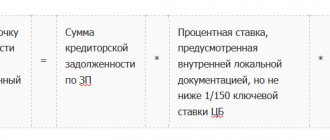Home / Labor Law / Responsibility / Disciplinary
Back
Published: 05/21/2016
Reading time: 7 min
0
2257
The legislation of the Russian Federation provides for clearly established rules and norms of behavior, violating which a citizen commits an offense or a crime, depending on whether this action belongs to a particular area of offenses.
Misdemeanors, in turn, are of several types: civil, administrative, disciplinary.
The main feature of a disciplinary offense is that it is closely related to labor relations.
- What is disciplinary action?
- What constitutes disciplinary offences?
- What is not considered a disciplinary offense?
- Penalties
The concept of disciplinary offenses and legal norms
The concept of a disciplinary offense and the procedure for holding an employee accountable for committing them are spelled out in the Labor Code in Art. 192. Also in this case, it is worth following Resolution No. 2 of the Plenum of the Supreme Court.
A disciplinary offense is an unlawful, guilty violation of labor or service discipline by an employee, for which disciplinary liability is provided. A disciplinary offense can be understood as an employee’s violation of the provisions of a job description, internal regulations or labor discipline.
In Art. 21, 189 of the Labor Code states the employee’s obligation to comply with these rules, and Art. 22, 191 provides for the employer’s right to reward an employee for the conscientious performance of his duties; Art. 22, 192, on the contrary, provides for punishment of employees if they fail to perform or perform improperly.
Also, on the issue of disciplinary offenses, it is necessary to take into account the provisions of Art. 81 of the Labor Code, which contains grounds for termination of an employment contract as a form of disciplinary action.
The possibility of simultaneously bringing an employee to disciplinary and financial liability is stipulated in Article 248 of the Labor Code of the Russian Federation. The duration of a disciplinary sanction is established in Art. 194 Labor Code of the Russian Federation. The maximum time limits given to the employer for penalties for committing a disciplinary offense by an employee are given in Art. 193 Labor Code of the Russian Federation.
The concept of disciplinary offense for certain categories of persons is specified in special laws. So, for example, according to Art. 28.3 Federal Law-76 “On the status of military personnel” it is not allowed to classify actions under orders and in necessary defense as misdemeanors.
Also, the internal regulations of the enterprise can be devoted to the definition and classification of offenses and the procedure for imposing penalties.
What is the essence of labor discipline?
Each employer establishes a number of specific rules of labor discipline, which are reflected in documents such as:
- internal labor regulations;
- collective agreement;
- an employment contract with a specific employee;
- employee's job responsibilities;
- labor protection instructions;
- legal requirements and internal regulations.
The employee is obliged to comply with these rules (Article 21, 189 of the Labor Code of the Russian Federation), and the employer has the right to reward the employee for their conscientious compliance (Article 22, 191 of the Labor Code of the Russian Federation) and to punish for non-compliance or improper execution (Article 22, 192 of the Labor Code of the Russian Federation ).
To punish an employee, you need to establish:
- whether the disciplinary offense is among those for which punishment can be applied;
- whether all prerequisites for filing claims against the employee have been met;
- whether the documents establishing the rules of labor discipline are drawn up correctly.
An employer may exercise the right to punishment if:
- the fact that the employee is familiar with the rules of labor discipline is confirmed;
- the employee is guilty of a disciplinary offense;
- the fact of the existence of the offense is documented;
- the employee is given the opportunity to justify his misconduct;
- all rules established for the procedure for applying punishment have been observed.
The decision to apply punishment must be made by a person who has the right to do so, which is documented for him. It could be:
- an individual who is an employer;
- the head of the organization or another official authorized by him.
Only compliance by the employer with all the rules established for the procedure for applying punishment will give grounds to consider this punishment legal and will not entail negative consequences if the employee decides to challenge it.
Signs and components of an employee’s disciplinary offense
Taking into account the definition of a disciplinary offense, which is prescribed in Art. 192 of the Labor Code, its structural elements include:
- The subject of the crime , which is an employee of the company (an employment contract must be concluded with him, otherwise he cannot be the subject of this violation).
- Subjective side , which consists in the presence of his guilt in committing an offense.
- The object of the crime , which is the labor schedule.
- Objective side , which is expressed in non-fulfillment or improper performance of work duties (for other reasons, the employee is not allowed to be subject to disciplinary liability).
The key distinguishing feature of a disciplinary offense from other offenses is that it is closely related to the employee’s performance of work duties. In order to be able to talk about the fact that an employee has committed a disciplinary offense, such an offense must be characterized by the following features:
- The violation must be expressed in non-fulfillment (improper performance) of labor duties by a specific employee.
- Violated duties must be imposed on the employee within the framework of labor legislation , under an employment contract or other local legal act.
- The form of the employee's guilt does not matter . A violation may take the form of a specific act or omission.
These signs must be observed: the absence of one of them deprives the employer of the right to bring the employee to disciplinary liability.
The employer’s tasks include proving not only the fact that the employee committed a disciplinary offense, but also the guilt of the employee, the illegality of his actions, the occurrence of consequences and establishing the amount of damage caused. The last two conditions are important so that the employer has grounds to hold the employee financially liable. Whereas disciplinary action is established regardless of the negative consequences.
In other words, the employer has the right to reprimand an employee if he is absent from his workplace, although losses or other negative consequences of his absenteeism did not appear.
Similar chapters from other works:
Administrative law of the Republic of Belarus
Determine whether there is an administrative violation in this case. Justify your answer with legal norms.
Solution According to Article 17.3. of the Code of Administrative Offenses of the Republic of Belarus, appearing in a public place while drunk is an administrative offense and entails a fine of up to eight basic units. According to Article 17.1...
Disciplinary liability and penalties
2.1 Disciplinary offense as the main condition of disciplinary liability
The legal definition of a disciplinary offense, enshrined in Article 192 of the Labor Code of the Russian Federation, was formulated on the basis of theoretical definitions. In the theory of labor law, the following definitions of disciplinary offense are given. So…
Disciplinary offense as a basis for disciplinary action
1.2 Disciplinary offense as a basis for disciplinary action
Labor obligation is a broad concept that covers both the employee’s labor function provided for in the contract and the procedure for performing it. Failure to comply with labor duties constitutes a disciplinary offense...
Comprehensive analysis of disciplinary liability of employees and its types
1.2 Disciplinary offense as a basis for disciplinary liability
Labor obligation is a broad concept that covers both the employee’s labor function provided for in the contract and the procedure for performing it. Failure to comply with labor duties constitutes a disciplinary offense...
The concept, essence, place and role of legal responsibility in a rule-of-law state and civil society
1.2 Disciplinary offense
A disciplinary offense is a violation of labor or service discipline, i.e. failure to perform or improper performance due to the fault of an employee of the assigned labor or official duties...
The procedure and conditions for the execution of criminal penalties not related to imprisonment
The procedure and conditions for carrying out punishment in the form of sending conscripts to a disciplinary battalion
One of the types of criminal punishment associated with the use of measures of corrective labor influence on convicts is the assignment of conscripts to a disciplinary battalion...
Bringing disciplinary action to an employee
1.2 Disciplinary offense as a basis for disciplinary liability
Disciplinary liability of an employee is an independent type of legal liability, which can only be imposed as a result of the employee committing a disciplinary act. It follows that a disciplinary offense...
Termination of an employment contract for violation of labor discipline by an employee
The concept of dismissal of an employee as a disciplinary measure. Disciplinary offense
Dismissal as a disciplinary measure can be applied to an employee for violating labor discipline, that is, for a disciplinary offense. To study this issue, it is necessary to define the concept of disciplinary offense...
5) guaranteed high-quality application of the law, an active and decisive fight against offenses, the inevitability of legal liability for everyone who has violated the law;
6) stability, sustainability of the rule of law, effective operation of the entire mechanism of legal regulation. These requirements form legality and ultimately should lead, in accordance with the ideals of legality, to the fact that everything set out in legal norms can become a reality, switch into the actual behavior of participants in social relations, into the actual legality of these relations into a strict legal order.
The immediate result of legal regulation, the crown of the action of law in a rule-of-law state is legal order - the state of actual orderliness of social relations, expressing the real, practical implementation of the requirements of law and the regime of legality.
The concepts of “legality” and “law and order” are close to each other and are usually used in the same series (or even interchangeably). And yet, legal order is the result of legality, characterizing the degree of implementation of its requirements, and in such a way that deep legal principles, the spirit of law, are realized. If legality is a regime of socio-political life that introduces certain requirements, then legal order is the actual “legal state” of the orderliness of social relations, that normal legal life that occurs as a result of the implementation of the requirements of legality.
Being the crown, the result of the action of law, the legal order, as it were, closes the chain of basic socio-political phenomena from the field of the legal superstructure (law - legality - legal order).
The main features of the legal order clearly and vividly express the features of the corresponding legal system as a whole.
Types of disciplinary offenses
The Labor Code does not contain a separate article that would list all disciplinary offenses or provide their classification. In Art. 192 of the Labor Code provides only the concept of misconduct and possible penalties.
In Art. 81 of the Labor Code, you can find those offenses that serve as the basis for holding the employee accountable in the form of dismissal. These are the most serious cases of violation of labor discipline by an employee:
- Failure by an employee to fulfill labor duties due to his absence from the workplace , refusal to continue work after a change in working conditions, evasion of undergoing a medical examination and training.
- Absenteeism.
- Showing up to work drunk.
- Disclosure of secrets to which an employee acquired access as part of the performance of his job duties.
- Committing an immoral act.
- Passing false documents when applying for a job.
It is worth noting that even for the above-mentioned offenses, the manager may decide not to fire the employee and assign him other forms of punishment.
In addition to disciplinary offenses that are prescribed in the Labor Code, a company can develop its own list of violations and record it in internal documentation. For example, in the Internal Labor Regulations, the Employee Code of Conduct, the Code of Ethics and Business Communication, etc.
Often these documents regulate in detail the procedure for interaction between an employee and his clients. They prohibit the use of profanity, insults and other forms of unethical behavior. Internal documentation may also provide for employee responsibilities such as:
- Maintain a polite tone when communicating with colleagues.
- Showing respect and tolerance to customers.
- Avoidance of obscene and offensive statements.
- Attentiveness to customer problems.
- Goodwill.
- Avoidance of conflicts and their provocations.
- Timely resolution of controversial issues.
- Formation and preservation of a favorable climate in the team.
- Maintaining and developing labor initiative.
The rules in force in the company must be familiarized to the employee against his signature before an employment contract is signed with him under Part 2 of Art. 22, art. 68 Labor Code. When changes are made to existing rules, employees are familiarized with them at least two months before they acquire legal force.
At the same time, the rules established within the company should not worsen the situation of employees and infringe on their rights, which are guaranteed to them by the Labor Code or the current collective agreement[/anchor]. Otherwise, they will be declared invalid, and the imposition of a penalty based on them will have no legal basis.
From judicial practice, examples of disciplinary offenses include unethical treatment of another employee, violation of cash discipline, improper control over the entrusted area of work, violation of legal norms, unauthorized leaving of the workplace, etc.
According to the explanatory letter of Rostrud dated 2021 No. 14-2/B-888, if there is a provision in the internal regulations and local regulations that harsh and rude statements are unacceptable towards clients, the employer can apply to employees who violate data rules, disciplinary sanctions.
At the same time, courts do not always regard incorrect and unethical behavior of employees as a basis for applying penalties to them. But for some professions, failure to comply with ethical standards and rules is clearly a misdemeanor. For example, this clearly applies to teachers or state and municipal employees. For judges, misconduct is negligence and irresponsibility in the performance of their official duties.
Dismissal for misconduct
The legislation establishes an exhaustive list of offenses for which the employer has the right to terminate the employment contract. However, the disciplinary measure is chosen directly by the employer; There is absolutely no need to fire an employee.
Serious offenses include:
- repeated failure by an employee to perform labor duties without good reason, if he has a disciplinary sanction;
- adoption of an unjustified decision by the head of the organization (branch, representative office), his deputies and the chief accountant, which entailed a violation of the safety of property, its unlawful use or other damage to the property of the organization;
- a single gross violation by the head of the organization (branch, representative office), or his deputies of their labor duties;
- the commission of guilty actions by an employee directly servicing monetary or commodity assets, if these actions give rise to a loss of confidence in him on the part of the employer;
- the commission by an employee performing educational functions of an immoral offense incompatible with the continuation of this work;
- a single gross violation of labor duties by an employee.
At the same time, legislators identify five gross one-time violations by an employee of his work duties, which can be an independent basis for dismissal even if the employee does not have other disciplinary sanctions.
Let's talk about them in more detail.
Responsibility
An employee who has violated legal norms or labor discipline rules may be subject to various types of liability depending on the severity of the offense. Thus, an employee can be brought to criminal liability only by a court decision, and to administrative liability - by order of supervisory authorities vested with the appropriate powers. Bringing an employee to disciplinary liability is within the competence of the employer.
Responsibility for disciplinary offenses comes in the form of disciplinary sanctions . According to Art. 192 of the Labor Code, three types of disciplinary sanctions are possible: reprimand, reprimand or dismissal.
Certain categories of employees face other types of such disciplinary action. For example, civil servants or police officers may be severely reprimanded under Art. 57 FZ-79 of 2004 or Art. 41.7 Federal Law No. 2201-1 of 1992. For prosecutors and customs officials, disciplinary offenses are fraught with a warning about incomplete official compliance under Art. 50 FZ-342 or clause 32 of FCS Order 31658 of 2008.
It is worth emphasizing that the Labor Code does not allow the use of forms of disciplinary sanctions that are not provided for by federal laws, charters and regulations on discipline under Part 4 of Art. 192 TK. Therefore, imposing fines on employees for disciplinary offenses is contrary to the law.
At the same time, an employee who has committed a disciplinary offense may be legally deprived of bonuses and other incentive payments. Or their size is subject to reduction if this is stipulated in the local regulations of the employer.
The employer himself has the right to decide what punishment to apply to the employee for the offense he has committed. Moreover, it must be commensurate with its gravity, the circumstances of its commission under Part 5 of Art. 192 of the Labor Code and the employee’s previous behavior, his attitude towards the performance of work duties.
The most common measure of liability is a reprimand.
Dismissal is the most severe form of punishment and is used in cases of gross violation of labor duties. In clause 6, part 1, art. 81 of the Labor Code states when it is permissible to dismiss an employee, even if he has committed an offense once. This list includes:
- Absenteeism.
- Showing up at work under the influence of alcohol or drugs.
- Disclosure of state, official or commercial secrets , including through disclosure of personal data.
It is also possible to dismiss an employee if he has repeatedly failed to fulfill his job duties, and provided that a disciplinary sanction has been applied to him during the last year and at the time of the repeated offense it has not been removed or extinguished. It does not matter what form the first penalty took: a reprimand or a reprimand.
It is also not necessary that we are talking about the same misconduct: for example, only about the employee being late or exclusively about poor quality work. Violations can be different.
Types of employee punishments
Depending on the type of disciplinary offense, it is determined what punishment can be applied. The Labor Code establishes 3 punishment options (Article 192):
- A reprimand is the lightest punishment, with minimal consequences for further work.
- A reprimand indicates a serious offense by a person who failed or negligently fulfilled the instructions of the manager.
- Dismissal is an extreme measure, after which further cooperation with the employee is no longer possible for the employer.
The list of disciplinary offenses regarded as gross violations includes a number of situations listed in labor legislation:
- Article 81 (clauses 5, 6);
- Art. 336 (clause 1);
- Art. 348.11.
- Types of penalties for being late for work under the Labor Code
Common examples of serious disciplinary offenses include:
- absenteeism with absence from work for more than 4 hours;
- leaving while drunk or under the influence of drugs;
- violation of a secret by an employee when signing a confidentiality agreement (meaning commercial, state, personal secret, etc.);
- damage to property or its theft;
- actions in violation of labor safety rules that created the danger of serious consequences for others and property;
- the actions of an employee who bears financial responsibility if they question his honesty;
- the employee's concealment of information about property belonging to family members, if there are grounds to make a claim for loss of trust;
- immorality of the teacher’s actions;
- making a decision by an authorized employee that resulted in material damage.
There are also narrower versions of violations recognized as gross. For citizens working as educators, the basis for punishment will be immoral behavior. Repeated violations by the teacher of the organization’s charter. For an athlete, a misdemeanor is disqualification and conviction of violating anti-doping rules.
Is it possible to impose double punishment?
In Part 5 of Art. 193 of the Labor Code provides a clear answer to the question of the possibility of applying double punishment to an employee for one offense. The rule contained here states that only one punishment can be imposed for the same disciplinary offense.
For example, it is not allowed to simultaneously reprimand an employee and dismiss him under Art. 81 TK. The employer must choose only one punishment that will be grounds for dismissal.
If, as a result of an offense, the employer suffered damage, then he has the right to simultaneously hold the employee financially liable and subject to disciplinary action.
For example, an employee was drunk at work, which resulted in the production of a batch of defective products. The employer may reprimand him and oblige him to compensate him for the cost of damaged materials.
Misdemeanor No. 2: intoxication
In this case, we are talking not only about alcohol, but also about drugs and any other type of toxic intoxication.
If an employee appears in this form at the workplace, the employer is obliged to first remove him from work. Otherwise, he will have to bear responsibility for all the consequences that may arise due to such a condition of the employee.
Dismissal on this basis is not influenced by any factors, that is, it is enough that the employee appeared in this form while performing his job duties. The fact whether an employee has been suspended from work also does not affect the possibility of his dismissal.
It seems that everything is simple: since he came drunk, it means we will fire him. However, the employer must prove that the employee is in a state of alcohol, drug or other toxic intoxication.
The most common method of proof is a medical report. If it was not possible to carry out a medical examination, then you should resort to witness testimony and draw up a report.
Only after collecting all the evidence and considering the degree of guilt of the employee can the employer decide to dismiss. Otherwise, the dismissal may be challenged.
Foreclosure procedure
When imposing a disciplinary sanction, the employer should adhere to the provisions of the Labor Code. This procedure includes the following steps:
- Violation of labor discipline by an employee must be recorded in writing . The fact of a disciplinary offense can be recorded in the form of an act, a memorandum addressed to management, or a decision of a special commission to investigate the incident. This document is drawn up in free form, but its preparation should be approached with all responsibility, since it can be used in the future as evidence in court. The act states the full name of the director, the circumstances of the incident, the full name of the employee, the type of offense committed by him, an indication of the clause of the local document or article of the Labor Code violated by the employee, the date of preparation of the document, the signatures of all drafters. The act may contain recommendations regarding the form of liability applicable to the employee.
- After the company's management has been informed of the disciplinary offense, a written explanation must be obtained from the employee . This request can be conveyed to the employee orally, but it is advisable to document it. A written notification of explanations is given to the employee against signature indicating the date of review. It contains the originating number, the date the application was submitted and the circumstances of the incident.
- The explanatory note is provided by employees within two working days after submitting the employer’s demand (under Article 191 of the Civil Code). If an employee is deprived of the right to explain his version of what happened to the employer, this may become a basis for invalidating the disciplinary sanction. At the same time, when calculating the two-day period, the individual work schedule of the employee is not taken into account.
- If, after two days, an explanatory note has not been received from the employee, then the employing company will issue a report on the employee’s refusal to provide an explanation . For example, the employer requested an explanatory note on Tuesday, and already on Friday, if no documents were received from the employee, he draws up a corresponding act. If the specified procedure is followed, then the lack of explanation does not prevent the employer from imposing a disciplinary sanction.
- If the employee receives an explanatory note and if the employer considers the information provided to be valid, the latter has the right to refuse to apply a disciplinary sanction . Then the procedure can be considered complete.
- If the employer is not satisfied with the explanations provided, or the employee does not provide them, the employer may impose a disciplinary sanction . To do this, he must adhere to certain deadlines. Thus, disciplinary sanction can be applied within one month from the moment the employer discovers this fact. In the specified time frame it is not allowed to include the time of illness of the employee, his stay on vacation, as well as the periods necessary to take into account the opinion of the representative body (based on Article 193 of the Labor Code). By default, the date of commission of a disciplinary offense is considered to be the moment information about it is received by the employee’s immediate management.
A sample report on a disciplinary offense committed by an employee can be downloaded here. The employee should be familiarized with the drawn up act against his signature, although this obligation is not enshrined in law. If the employee refused to familiarize himself with the act, then this fact must be indicated in the document.
Also in Art. 193 of the Labor Code specifies time limits for imposing disciplinary sanctions. They are six months after the commission of an offense or 2 years if the offense became known during audit or verification activities.
A disciplinary sanction is imposed by order. A unified form of such an order is not provided for by law. But this document should include the following information:
- Employee's name.
- His position.
- Name of structural unit.
- Description of the offense committed.
- Indication of points of local documentation or provisions of labor legislation that were violated by the employee.
- Links to memos and explanatory notes from the employee , acts, minutes of the meeting of the commission to investigate what happened, etc.
- The selected type of disciplinary action that will be applied to the employee.
- Date of the order and signature of the manager.
- The employee must be familiarized with this order and signed . If he refuses to familiarize himself with the order, then a special act is drawn up about this fact. Also, information about the disciplinary sanction must be entered into the personal card in the “Additional information” section (at the discretion of the employer).
The work book does not display information about disciplinary action, except in cases where the disciplinary action is dismissal (based on Part 4 of Article 66 of the Labor Code).
A disciplinary sanction is automatically lifted after one year if the employee has not committed another violation during this time (according to Article 194 of the Labor Code). But the employer can, on its own initiative or at the request of the employee’s immediate superior, remove the penalty early.
According to the norms of the Labor Code, violation of the current procedure for imposing disciplinary sanctions is not allowed. For this, the employer faces liability in the form of a warning or an administrative fine under Part 1 of Art. 5.27 Code of Administrative Offenses of the Russian Federation.
The fine for officials can range from 1,000 to 5,000 rubles, for legal entities - 30,000-50,000 rubles. If the specified act of violation of labor law is committed again, then the employer faces an administrative fine in the amount of 10,000-20,000 rubles. for officials and 50,000-70,000 rubles. for legal entities.
Questions and answers
In our company, labor discipline is constantly violated.
The vast majority of employees are late, from bosses to ordinary employees - some by 10 minutes, some by a couple of hours, despite the fact that the internal labor regulations stipulate a work schedule from nine to six in the evening. No one has ever paid special attention to lateness, but now I have a conflict situation with the head of the department, and he is looking for a reason for my dismissal. My only offense is regularly being 30-40 minutes late. Now I have been asked to provide written explanations regarding the delays in the previous month. Apparently they will reprimand you. Can I be given several reprimands for the past months in a couple of days and, accordingly, fired in a few days? And one more thing: what is the judicial practice regarding dismissal for regular lateness, when all employees in a company do not adhere to the exact work schedule, and only one is fired for this? What are my chances of winning my case? Expert:
Tatiana,
Can I be given several reprimands for the past months in a couple of days and, accordingly, fired in a few days?
In accordance with Article 192 of the Labor Code of the Russian Federation, for committing a disciplinary offense, that is, failure or improper performance by an employee through his fault of the labor duties assigned to him, the employer has the right to apply the following disciplinary sanctions: reprimand, reprimand, dismissal.
Please note that the current labor legislation establishes the deadline for applying disciplinary sanctions:
Disciplinary action is applied no later than one month from the date of discovery of the misconduct
, not counting the time of illness of the employee, his stay on vacation, as well as the time necessary to take into account the opinion of the representative body of employees.
A disciplinary sanction cannot be applied later than six months from the date of commission of the offense, and based on the results of an audit, inspection of financial and economic activities or an audit - later than two years from the date of its commission. The specified time limits do not include the time of criminal proceedings.
Article 193 of the Labor Code of the Russian Federation
As explained in paragraphs. “b” part 2 clause 34 of the Resolution of the Plenum of the Supreme Court of the Russian Federation dated March 17, 2004 N 2 “On the application by the courts of the Russian Federation of the Labor Code of the Russian Federation”
the day the offense was discovered
, from which the flow of the month period begins, is considered the day when the person to whom the employee is subordinate for work (service) became aware of the commission of an offense, regardless of whether he was vested with the right to impose disciplinary sanctions.
That is, in your case, disciplinary measures can be applied for the previous 1 month.
According to Art. 192 of the Labor Code of the Russian Federation for committing a disciplinary offense, that is, failure or improper performance by an employee through his fault of the labor duties assigned to him, the employer has the right to apply the following disciplinary sanctions: reprimand, reprimand, dismissal on appropriate grounds.
According to Art. 91 of the Labor Code of the Russian Federation, working time is the time during which an employee, in accordance with the internal labor regulations and the terms of the employment contract, must perform labor duties.
According to Art. 22 of the Labor Code of the Russian Federation, the employer is obliged to: familiarize employees, upon signature, with the adopted local regulations directly related to their work activities.
According to clause 5, part 1, art. 81 of the Labor Code of the Russian Federation, an employment contract can be terminated by the employer in the event of repeated failure by the employee to fulfill his work duties without good reason, if he has a disciplinary sanction.
At the same time, when applying disciplinary measures to an employee, in accordance with Part 5 of Art. 192 of the Labor Code of the Russian Federation, the severity of the offense committed and the circumstances under which it was committed must be taken into account.
What is the judicial practice regarding dismissal for regular tardiness, when all employees in a company do not adhere to the exact work schedule, and only one is fired for this?
Disciplinary sanctions are applied individually to the employee and for the offenses he has committed.
Expert:
Article 81 p. 5) provides such grounds for dismissal at the initiative of the employer as repeated failure by an employee to fulfill work duties without good reason, if he has a disciplinary sanction. Therefore, if one or more disciplinary sanctions are imposed on you, the next violation of labor discipline may result in legal dismissal. But at the same time, the procedure for applying disciplinary sanctions must be observed:
- a written explanation is required from the employee,
- a disciplinary sanction is applied no later than one month from the date of discovery of the misconduct, not counting the time the employee was ill or on vacation; - a disciplinary sanction cannot be applied later than six months from the date of the commission of the misconduct,
— for each disciplinary offense only one disciplinary sanction can be applied.
The employer's order (instruction) to apply a disciplinary sanction is announced to the employee against signature within three working days from the date of its publication, not counting the time the employee is absent from work.
The fact that other employees commit disciplinary violations does not matter.
At work, they reprimanded us for systematic lateness, referring to the arrival and departure log, where we independently check in, and without specifying for what period and time they identified the delays. 4 months ago, the boss changed the work schedule for all employees - instead of 9-18 it became 8:30-17:30 - this is not stated in any local regulations, and there is not a single word about this attendance log in any document. I am late periodically from 5 to 10 minutes, more often from 5 minutes. If we count over the last month, then the HR department has 1-2 of my explanations. There are no complaints about my fulfillment of my labor obligations. Is it legal to reprimand me if, according to Article 192 of the Labor Code of the Russian Federation, a disciplinary offense is failure to perform/improper performance of job duties?
Expert:
In fact, the grounds for bringing you to disciplinary liability were the explanatory notes, and not the journal and non-existent LNA. I admit that in these explanatory notes you admitted the facts of being late, in this case it will be difficult to prove the unlawfulness of the penalty.
At the same time, Art. 189 of the Labor Code of the Russian Federation provides that
the employer is obliged, in accordance with labor legislation and other regulatory legal acts containing labor law norms, collective agreements, agreements, local regulations, and employment contracts, to create the conditions necessary for employees to comply with labor discipline. The labor schedule is determined by the internal labor regulations. Internal labor regulations are a local regulatory act that regulates, in accordance with this Code and other federal laws, the procedure for hiring and dismissing employees, the basic rights, duties and responsibilities of the parties to an employment contract, working hours, rest periods, incentives and penalties applied to employees, and as well as other issues of regulating labor relations with this employer.
A Art. 190 of the Labor Code of the Russian Federation establishes the procedure for approving the Internal Labor Regulations:
Internal labor regulations are approved by the employer, taking into account the opinion of the representative body of employees in the manner established by Article 372 of this Code for the adoption of local regulations. Internal labor regulations are usually an annex to the collective agreement.
Thus, if the removal of a disciplinary sanction is more important to you than your relationship with your superiors, there is every reason to go to court to resolve a labor dispute, provided that the internal labor regulations have not been approved in the manner prescribed by law. The logic in this case is simple: you cannot break rules that do not exist.
Extenuating circumstances
When applying a disciplinary sanction to an employee, the employer must prove that the violation occurred precisely through the fault of a particular employee, and also take into account all the circumstances of the incident. Penalties are not imposed in case of violation of labor discipline for a valid reason:
- If the employee does not have the necessary materials.
- If the employer violates the working conditions of employees.
- In case of incapacity.
- When an employee is summoned to court or law enforcement agencies.
- For family reasons.
- In the event of force majeure and natural disasters.
The presence of mitigating circumstances that led to a violation of labor discipline must be proven by the employee himself. He must present to the employer an explanatory note outlining such circumstances, as well as supporting documents or witness statements.
For example, an employee voluntarily left his workplace because he learned about his child’s injury. This may become a mitigating circumstance when choosing a punishment. The validity of the reasons must be determined by the employer at his own discretion.
Federal Law No. 76 “On the Status of Military Personnel” provides the following mitigating circumstances for committing an offense that facilitate disciplinary liability:
- repentance of the perpetrator;
- voluntary reporting of guilt;
- independently preventing the negative consequences of one’s offense;
- committing an offense in a state of strong mental agitation;
- in the event of difficult personal or family circumstances.
The commander may recognize other circumstances of the incident as mitigating factors.
The concept of misconduct
Even though these two concepts are quite similar, they are, in fact, fundamentally different from each other. Misdemeanors are illegal acts that are not considered socially dangerous.
Upon their occurrence, as a rule, there follows not punishment, but punishment. If an offense is committed, responsibility will still follow, but it will depend on its type.
Quite often, misdemeanors are classified as minor violations, which are attributed to carelessness or neglect of the rules and norms of society.
Civil misdemeanors
This type of offense can be considered the most harmless in relation to society. If we consider civil offenses, examples include the following:
- Copyright infringement.
- Spreading false rumors about a person that are offensive in nature.
- Failure to fulfill contractual obligations.
- Causing property damage.
- Concluding transactions that are not legal.
If a person has committed an offense of this nature, the following punishment may follow:
- Compensation for damages.
- Compensation for moral damage.
- Payment of "penalty".
- Forced restoration of violated rights, etc.
Despite the fact that civil offenses are considered the least dangerous for society, a violation is a violation, so it should not be ignored.
Administrative offenses
This category includes any illegal actions that violate public order, encroach on state property, freedom and rights of citizens. This group also includes offenses in the field of health protection, labor protection, the environment, and so on.
For example, careless driving or failure to comply with fire safety rules can be classified as administrative offenses. Violation of public order, encroachment on architectural and historical monuments also fall into this category of violations.
Such offenses may typically result in:
- Fine.
- Confiscation.
- Correctional work.
- Administrative arrest for up to 15 days.
Only bodies that are authorized to do so can consider administrative violations and impose penalties.
A person can be punished for an administrative violation within a year from the date of its commission.
Conventional classification
We have looked at what offenses are, and it becomes obvious that quite often the lines between different types of offenses are quite blurred and arbitrary. For a long time now, law enforcement agencies have been talking about transferring more than 60 administrative offenses to the category of criminal offenses.
Of course, a misdemeanor is an act that carries less serious consequences for society, and, therefore, should be punished less severely. But we should not forget that very often a misdemeanor is separated from a real crime by only one insignificant detail, so the border between these two offenses is quite fragile.
For example, if a driver drives a car at too high a speed, then this can be classified as a misdemeanor, but if as a result of such reckless driving he hits a person, then it will be a crime.
In order not to have to understand the difference between a crime and a misdemeanor and not to guess what punishment may follow, it is necessary to comply with all the rules and regulations that exist in our society and be a law-abiding citizen.
Types of offenses
We have considered what offenses are, but all of them can affect different areas of our lives and are committed in relation to, for example, administrative or civil norms. It is on this basis that the classification is built. The types of offenses are as follows:
- Disciplinary.
- Administrative.
- Civil misdemeanors.
- Immoral.
Most legal officials believe that any misdemeanor is the first step towards committing a crime, especially when the person has not suffered any punishment for committing it.
Let's look at the types of offenses in more detail.
Immoral offenses
These types of offenses are often classified as civil, but it should be noted that immoral actions are most often intentional and involve violent actions towards another person.
If we consider such offenses, we can see that it is not civil rights that are being violated, but moral norms. Examples include:
- Committing violent acts for educational purposes.
- Humiliation of human dignity.
- Assault towards one's students.
- Public insult.
- In some cases, demanding bribes from students during the session is also considered an immoral offense.
- Appearing drunk in public places.
- Involvement of minor children in the process of drinking alcoholic beverages.
Quite often, the participants in such proceedings are employees of educational institutions, teachers and educators. If it is proven that such an offense has been committed, then this is a valid reason for dismissing the employee from his position. In this case, a corresponding entry must be made in the work book, which in the future can lead to certain difficulties in finding a new place of work.
If an immoral offense is committed by a person who has nothing to do with the process of raising children, then dismissal may not follow, but other penalties are applied.
Immoral offenses are considered the most difficult in terms of proceedings and punishment. Since the final decision on whether to classify an offense as immoral or whether it is evidence of a disgusting upbringing will depend on the personal moral qualities of the one who is involved in the proceedings of this case.
The imposition of any penalty for committing an immoral offense must occur no later than a month from the date of its discovery and no later than six months from the moment it was committed.
What is the difference between a misdemeanor and a crime?
Crimes and misdemeanors, from the point of view of criminology, differ only in severity, but they are violations of the law.
Only after committing a crime does punishment always follow, which can be presented (depending on the severity) in the form of a real prison term and a large fine.
For many, a crime is when murder or harm to human health is committed. But in fact, even without killing anyone, you can commit a crime (an example is financial fraud).
People's misdeeds pose a much lesser danger to society, and therefore the punishment should not be so severe. Quite often they are limited to one warning.








